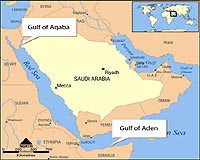 |
Mogadishu, Somalia (UPI) Apr 13, 2010 A major offensive by the Transitional Federal Government against al-Shebab Islamist militants has yet to materialize but, reports claim, al-Qaida is reinforcing insurgents with some heavyweight veterans infiltrated from Yemen. At least a dozen senior operatives from al-Qaida in the Arabian Peninsula were reported on April 7 to have arrived in Somalia over the previous two weeks apparently to provide military expertise to aid al-Shebab. The Somali Islamists, who control most of the capital Mogadishu and much of the country's southern and central regions, have close links to al-Qaida. The arrival of the operatives from Yemen, across the Gulf of Aden from Somalia, is likely connected to the impending offensive by TFG forces. But it probably has a longer-term objective as well: unifying jihadist groups in Yemen and Somalia. In that regard, the reported September 2009 arrival in Somalia of veteran al-Qaida field commander Fazul Abdullah Mohammed, alleged mastermind of the 1998 U.S. embassy bombings in East Africa, takes on an added importance. It underlines the long-held fears of U.S. counter-terrorism experts that al-Qaida, taking a hammering in Afghanistan and Pakistan, seeks to build a new front in the lawless and ungovernable spaces of Yemen and the Horn of Africa as well as North Africa. On April 5, The Yemen Post newspaper quoted official sources in Sanaa as saying that AQAP had relocated its military base of operations to Somalia in the face of a heavy security crackdown by the regime of President Ali Abdullah Saleh. But that was generally seen as a fanciful, self-serving claim intended to make Saleh's forces look good in Washington. However, the Sanaa sources mentioned that 15 top al-Qaida operatives had gone to Somalia. That bolstered other reports that highly experienced al-Qaida cadre had been deployed in Somalia to aid the insurgents there. Kenyan Treasury Minister Abdirahman Oman Osman said the TFG intelligence service in Somalia had told him that the 12 infiltrators from Yemen were indeed seeking to establish a headquarters but not necessarily to eclipse operations being mounted by AQAP. "They were sent to assess the situation to see if al-Qaida may move its biggest military bases to southern Somalia since they're facing a lot of pressure in Afghanistan and Iraq," he was quoted as saying. Kenya, Somalia's western neighbor, supports the TGF and hosts a large number of Somalia refugees. The AQAP operatives, some disguised a humanitarian workers, also reportedly carried funds to al-Shebab to help it recruit more men. Kenyan security authorities recently arrested several suspected al-Qaida activists, including men of Somali origin who were seeking to return to Somalia. Others were arrested in Uganda, which has deployed troops in Somalia as part of an African Union peacekeeping force. These movements were unusual and bolstered suspicions that al-Qaida has become increasingly active in the region. In early April, Uganda's anti-terrorism task force, run by military intelligence, arrested Hashi Hussein Farah, who is on an international list of wanted terrorist fugitives, and a dozen other al-Qaida suspects in the slums of Kampala. Farah, who carries an Australian passport, had been arrested by the Kenyans on March 2 when he tried to enter the country from Uganda. He apparently was able to bribe his way out of prison and made his way back to Uganda, possibly to set up attacks in Uganda for aiding the TFG. Counter-terrorism operatives in Kenya say they believe Fazul traveled to Somalia from Tanzania to take command of the jihadist forces following the assassination in southern Somalia of Saleh Ali Saleh Nabhan by U.S. SEALs on Sept. 14, 2009. The Kenya-born Nabhan had been a close associate of Fazul for many years. Both were wanted for the Aug. 7, 1998, U.S. embassy bombings in Nairobi, Kenya, and Dar es-Salaam, Tanzania, in which 241 people were killed. Fazul, born in the Comoros Islands in the Indian Ocean off the coast of Mozambique, took command of al-Qaida's East Africa cell following the embassy bombings. Kenyan officials and diplomatic sources in the region said at the time the al-Shebab leadership had been weakened by splits between key figures and by feuding with another Islamist militia, Hezb al-Islami. Al-Qaida now seems to be making a significant effort to overcome these setbacks and reforge al-Shebab into a fighting force.
Share This Article With Planet Earth
Related Links The Long War - Doctrine and Application
 Saudi Arabia faces new al-Qaida threat
Saudi Arabia faces new al-Qaida threatRiyadh, Saudi Arabia (UPI) Apr 12, 2010 The recent roundup of more than 100 suspected al-Qaida operatives in Saudi Arabia underlined the severity of the terrorist threat facing the kingdom from neighboring Yemen. It also emphasized the key role in the emerging campaign played by Said al-Shihri, who, as deputy leader of al-Qaida in the Arabian Peninsula, seems to have charge of all operations against the Saudis. The Sau ... read more |
|
| The content herein, unless otherwise known to be public domain, are Copyright 1995-2010 - SpaceDaily. AFP and UPI Wire Stories are copyright Agence France-Presse and United Press International. ESA Portal Reports are copyright European Space Agency. All NASA sourced material is public domain. Additional copyrights may apply in whole or part to other bona fide parties. Advertising does not imply endorsement,agreement or approval of any opinions, statements or information provided by SpaceDaily on any Web page published or hosted by SpaceDaily. Privacy Statement |